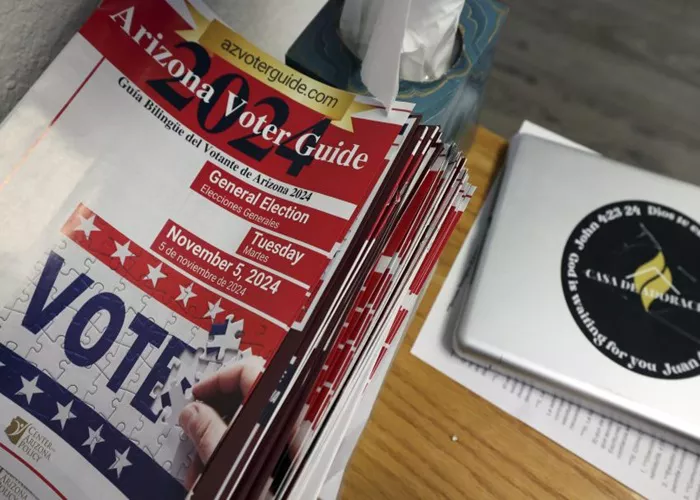Immigration remains a top issue for voters this election cycle. In Arizona, a new measure set for a vote next week reflects growing frustration over the situation at the U.S. southern border. Proponents of Proposition 314 argue it addresses these concerns by allowing state and local law enforcement to arrest and deport immigrants who cross the border illegally between official ports of entry.
If approved, Arizona will join other states like Texas, which enacted similar laws last November. This trend has sparked debate about the role of states in immigration enforcement. Although Arizona’s measure has garnered less media attention than Texas’ law, local leaders believe it resonates with voters. David Rhodes, sheriff of Yavapai County and a supporter of the measure, stated that it is “immensely popular with the voters.”
Recent polls indicate strong support for Proposition 314, with nearly two-thirds of Arizonans in favor. Rhodes emphasized that immigration and border security are paramount concerns. He asserted that federal inaction has led to the necessity of this ballot measure.
As president of the Arizona Sheriffs’ Association, Rhodes highlighted the unique public safety challenges faced by border counties. In Yavapai County, residents are particularly worried about fentanyl trafficking, an issue the proposed law aims to tackle. The act would classify the sale of fentanyl resulting in death as a Class 2 felony.
The authors of Proposition 314, known as the Secure the Border Act, cited that nearly 7 million illegal border crossings were encountered by U.S. Customs and Border Protection from 2021 to 2023. This figure excludes an estimated 2 million individuals who evaded detection altogether. Although illegal crossings surged earlier this year, recent numbers have shown a decline.
To deter illegal immigration, the proposed law would impose penalties for immigrants who use false documents to obtain public benefits or employment. It also mandates that state agencies use an e-verify system to check the immigration status of applicants for state or federal benefits. The authors argue that human smugglers often mislead immigrants about available opportunities and benefits.
Arizona State Senator John Kavanagh, a Republican who supported the measure, noted that cities across Arizona are overwhelmed. He pointed out that the immigration crisis extends beyond border towns, with cities like New York and small midwestern towns facing increasing numbers of arrivals.
The most controversial aspect of Proposition 314 makes it a state crime for immigrants to enter Arizona illegally. Local law enforcement would be authorized to arrest and detain such individuals, and state judges could order deportations. If an immigrant opts to leave voluntarily, charges may be dismissed; otherwise, they could face a Class 4 felony charge.
The law specifies that law enforcement must have probable cause to make an arrest, requiring officers to witness the illegal crossing, have video evidence, or utilize other lawful means. Kavanagh emphasized that the measure targets “bad actors” trying to avoid Border Patrol and is narrowly focused on enhancing law enforcement presence.
However, critics argue that the law’s provisions are too vague and could lead to individual interpretation by officers. Alba Jaramillo, co-executive director of the Immigration Law and Justice Network, warned that Proposition 314 could damage trust between immigrant communities and law enforcement, ultimately making communities less safe. She also raised concerns about potential racial profiling.
Jaramillo likened the measure to Arizona’s 2010 Senate Bill 1070, known for allowing police to check individuals’ immigration status based on “reasonable suspicion.” That law faced legal challenges and was ultimately struck down by the U.S. Supreme Court.
Kavanagh dismissed fears of racial profiling as a “scare tactic,” insisting the law will be focused on the border and will not retroactively affect immigrants already residing in Arizona illegally.
Proposition 314 would not be enacted unless Texas’ similar law, or one from another state, has been in effect for at least 60 days. Texas’ law allows state law enforcement to charge illegal border crossers with a misdemeanor. However, this law is currently paused due to ongoing legal challenges.
The legal questions surrounding Texas’ law could influence Arizona’s proposition. Denise Gilman, co-director of the immigration clinic at the University of Texas at Austin, noted that the case raises issues of state authority over immigration enforcement, which traditionally falls under federal jurisdiction.
The Mexican government has also expressed concerns about Texas’ immigration law, warning of its potential impacts on Mexican nationals in the U.S. Mexican consul Rafael Barceló Durazo highlighted the importance of coordinated immigration policies with federal authorities.
Critics of Proposition 314 point out that many local governments lack the resources to enforce the law effectively. Donald Huish, mayor of Douglas, a small border community, acknowledged the frustrations leading to the measure’s support. However, he argued that it is not a sustainable solution and could overburden already strained police resources.
The Grand Canyon Institute estimates the measure could cost Arizona $325 million annually. Huish suggested that funds would be better spent on improving surveillance and coordination with federal agencies.
Importantly, the act does not mandate local law enforcement action if resources are lacking, nor does it provide specific funding. Rhodes noted that the language of the law is permissive, allowing enforcement but not requiring it. Without additional funding or commitment from counties, the measure may lack effectiveness.
Despite the challenges, Rhodes believes the act is a crucial tool for law enforcement. While illegal crossings have decreased recently, he cautioned that changes in Mexico’s enforcement policies could lead to increased crossings again. “Both parties have failed on border security, and states are left feeling exasperated,” he said. “Proposition 314 is the only tool being offered.”
Related topics:
- Trump’s Deportation Strategy Could Resurrect Family Separations
- Shocking Anti-Immigrant Decision by Trump-Appointed Judge Reveals the Truth
- State Department Promises to Create One Million New Visa Appointments


